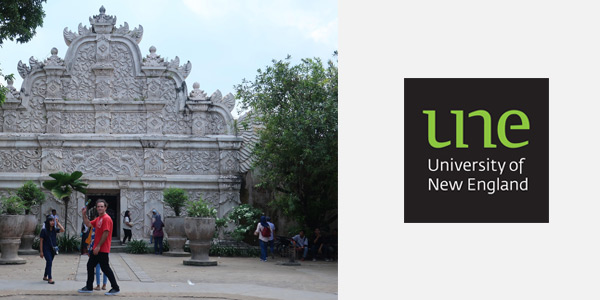
Jack Wythes is from The University of New England. Jack will complete a year of study in Indonesia with ACICIS in 2018. In his first semester with ACICIS, he undertook the Flexible Language Immersion Program at Gadjah Mada University with the support of New Colombo Plan mobility program funding.
Q: Why did you decide to undertake the ACICIS’ Flexible Language Immersion Program?
I have already been studying Indonesian at university in Australia for a couple of years and the program seemed a fantastic opportunity to improve my language skills whilst having a great time living in Indonesia.
Q: Which classes are you currently enrolled in?
I will be studying at UGM for two semesters, so for my first semester all the classes I enrolled in were Indonesian language classes for foreign students, so that I can improve my language skills as much as possible before taking regular classes next semester. The classes are:
- Tata Bahasa – Grammar
- Percakapan – Conversation
- Kebudayaan Indonesia – Indonesian Culture
- Terjemahan – Translation from English to Indonesian
- Menulis – Writing
- Bahasa Indonesia untuk Riset – Indonesian Language for Research. I am taking this class so that I can conduct research into tobacco advertising in Indonesia.
Q: How will your proficiency in Indonesian Language gained through the Flexible Language Immersion Program influence your future career or study?
I am undertaking the program for two semesters because I really enjoy being in Indonesia – I enjoy studying Indonesian and I want to able to communicate as well as possible with Indonesian people. Although I am not particularly focused on future career paths, I feel that becoming a competent Indonesian speaker gives me more freedom and opportunity in terms of future employment.
Q: How different is in-country Indonesian language learning to your previous experiences in an Australian classroom environment?
Apart from having to dress formally to attend classes and there being far less emphasis placed on punctuality in Indonesia, I do not think there is a huge amount of difference. However, while studying in Indonesia you have the opportunity to put what you are learning in class into actual situations every single day, and improve your ability to communicate in Indonesian much more quickly.
Q: Are you involved in any clubs/societies at the University?
No, there are some really great groups and activities you can get involved with at UGM, but there is so much to do in Yogya! I’ve made a lot of friends and I’ve always had plenty of fun outside of my studies.
Q: What do you like to do in your spare time in Yogyakarta?
Mostly just hang out with friends. It is very easy to make friends in Yogya and there are always lots of fun and interesting events to attend – live music, dance performances, festivals, art shows, etc.
Q: Are you undertaking an internship or volunteering while in Indonesia?
I am not doing an internship as part of the program, but I have been able to volunteer at a hospital in Yogyakarta which runs a program teaching English to blind people.
Q: What is your favourite Indonesian food?
Bakso – from any warung in Yogya.
Sate padang – particularly at Sate Padang Asli in Jalan Kaliurang, and any other type of Padang food.
Q: What is your favourite Indonesian word or phrase?
Cuci mata – literally to wash the eyes… but it also means to refresh/satisfy your eyes and mind by checking out some good looking girls/guys/people/things.
Q: What places in Indonesia have you visited during your semester so far?
Studying in Yogya there is plenty of free time to travel to different places. I’ve already visited Lombok, plenty of beaches to the south of Yogyakarta, Mount Merapi and several national parks north of Yogya, the Gili Islands, and Borobudur.
